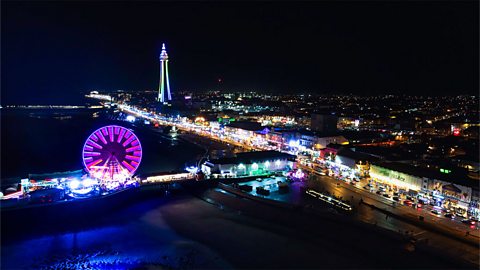What do you know?
What is ecotourism?
Ecotourism is any form of tourism that aims to minimise negative impacts on the environment and to local people.
Key points
- Tourism can have positive and negative effects on people and the environment.
- Tourism is an important industry and can aid the development of low-income countries.
- Tourism requires management or it can become unsustainable.
The effects of tourism

Tourism is when people travel away from home for pleasure.
Tourism is very important for countries as it brings lots of money into a country but tourism can have both positive and negative social, economic and environmental effects on a country.

Positive effects of tourism
Social
- amenitiesUseful features of a place. built for tourists such as health centres or infrastructureThe parts of the built environment needed for a country to function such as roads, water pipes and ports. such as roads, water and sewerage systemsThe infrastructure that moves sewage or surface runoff (storm water, meltwater, rainwater) using sewers. can also benefit locals leading to a higher standard of livingThe degree of wealth and material comfort available to a person or community..
- For those that can afford to travel, visiting other countries provides an opportunity for tourists to meet new people and discover new places. This is often only an option for tourists from high-income countries.
Economic
- The tourism industry is worth trillions of pounds worldwide providing jobs and income to millions of people.
- It is estimated that tourism accounts for about 10% of the world’s gross domestic product (Gross Domestic Product - GDPThe total value of goods produced and services provided in a country during one year.).
- Over 100 million people are employed directly in the travel and tourism sectorA part of the country’s economy.with hundreds of millions more employed in industries which support this sector. This might include baggage handlers at airports or farms who provide food to restaurants.
- This money provides income which can be used to develop and invest in schools, hospitals, infrastructure and new technology.
- This is especially important for low-income countries (LICsLow Income Countries. Countries that have a low income, such as Haiti and Uganda.) such as Jamaica where tourism accounts for 35% of their income.
Environmental
- Tourism is often associated with having a negative environmental impact although sustainableSomething that is good for people and the environment now and in the future. tourism can actually help to protect fragileEasily damaged. environments.
- The money earned from tourism, can be invested in conservation.
- Tourism can provide different types of jobs meaning people aren’t forced to damage the environment in order to make a living.
- Tourists can be educated on the importance of environmental protection.
Negative effects of tourism
Social
- Tourism can provide a source of conflictA serious disagreement between individuals or groups. between tourists and locals.
- Culture and traditions can be lost with the influx of new people to an area.
- If a resort is popular it can result in overcrowding and traffic jams. For example 20 million tourists in the UK visit the Lake District every year, causing major traffic jams in villages there.
Economic
- Jobs are often seasonalOnly for part of the year. and poorly paid.
- Money is frequently lost due to economic leakageWhere money leaves the country and ends up elsewhere. as hotels are often owned by foreign firms.
- If a country becomes reliant on tourism, it can make it vulnerable if tourists stop visiting.
- Sometimes tourist numbers fall due to natural disasterA natural event such as an earthquake or flood which causes loss of life or extensive damage., global pandemics, terrorist attacks or civil unrestAn activity such as a demonstration or riot against the authority of a country..
- Tunisia in North Africa has experienced a number of setbacks to its tourism industry. Terrorist attacks saw the number of visitors fall. The tourist industry began to revive as confidence returned, only to see a 60% decline in visitors due to the Covid-19 pandemic.
Environmental
- The natural environment can become damaged as tourists increase waste and pollution.
- New buildings may damage natural habitats and disrupt fragile ecosystems.
What is the estimated percentage of world GDP earned by travel and tourism?
An estimated 10% of world GDP is earned by travel and tourism.
Ecotourism
Sustainable tourism in the Costa Rican rainforest
On the other side of the Pacific from Kalimantan lies Costa Rica. Until recently, it led the world in deforestation. But now, most of the remaining Costa Rican rainforest has been turned into national parks, protecting it against further exploitation. And the local people are finding ways to earn a living from the trees without cutting them down.
One way is by turning the forests into a tourist attraction. Small groups pay for guides to show them the wonders of this tropical paradise. But this brings in a small return and large-scale tourism would risk destroying the very environment people have come to see. So this can’t be the only answer.
In the Talamanca region of Costa Rica, people are trying to farm in a sustainable and profitable way. Formerly a forester in Costa Rica, Luis Rodriguez wanted to experiment with farming in the rainforest. When the chance came, he bought a farm on the edge of the forest, knowing it would be a challenge.
This farm was severely degraded. Some places had no vegetation at all, which is very rare in the tropics. Instead of planting a new crop, Luis let the surrounding forest grow onto his land naturally. Copying the way the forest grows, he planted crops amongst the trees. Now, 10 years later, Luis’s farm is thriving.
It supplies more than enough produce to feed his family, but Luis also grows some crops to sell as high-value organic produce. Every fortnight, bananas are harvested. And once a year, there’s the valuable cocoa crop the basis of chocolate to take in. And he can chop down the odd tree, without spoiling the farm’s balance.
His approach seems to be working. Unlike his neighbours, Luis and his family live in a big house with modern conveniences, like a TV and a computer.
The rewards aren’t just financial. We live in a great environment, co-existing with all kinds of plants and animals. Having started with a barren farm and having worked hard to improve it, my dream is becoming reality.
Farming isn’t the only way the local people are making money from conserving the forest.
Guillemo Moro works for a forestry organisation that’s developing sustainable techniques. Instead of cutting trees down, they seek out ones that fall naturally. The next step is to turn the tree trunk into several logs. But the logs still have to be moved to where they can be of use. Guillemo’s secret weapon helps.
The buffalo is strong and agile enough to remove the logs, without the need to build a road. There’s very little damage to the surrounding forest. Regeneration can take place in months instead of years.
This idea of small-scale forestry and adopting a long-term view wasn’t easy to sell to the locals.
People at first didn’t like us, but little by little, we’ve won them over. So much so, that those who weren’t interested are now working with us. The conservation work doesn’t stop there. The timber is for a lodge for tourists visiting the forest. By combining eco-tourism with wood management, we avoid depending on only one resource. We can gain from both activities, without damaging the forest, and we can use the lodge as a way to protect the forest.
As people like Guillemo have shown, it is possible to make a living from the rainforest, without chopping it down. But at the moment, they are in the minority.
People around the world must adopt the same approach, if the rainforests are to be saved.
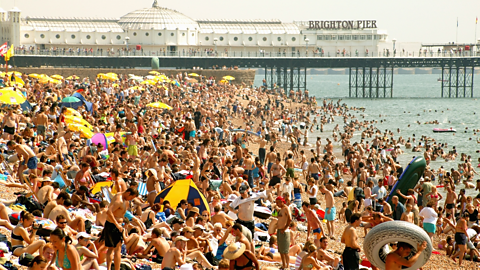
Image caption, Mass tourism can have serious impacts on the environment of a resort as a result of overcrowding.
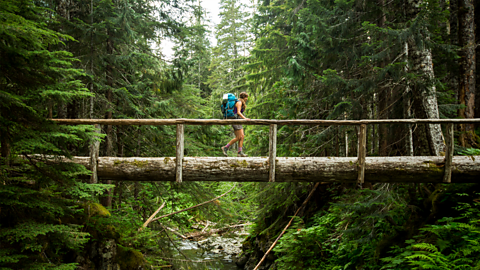
Image caption, One solution to the problems of tourism is ecotourism.
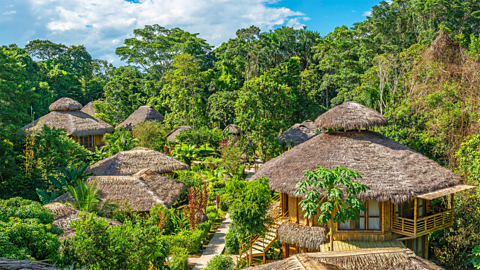
Image caption, Ecotourism activities minimise the impact on the environment and local people by building on a small scale and from natural materials. They also encourage conservation of the natural environment.
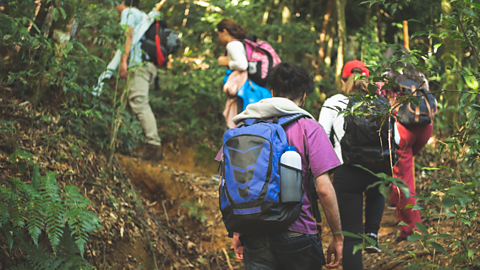
Image caption, Activities in ecotourism resorts include visiting and learning about fragile ecosystems such as rainforests.
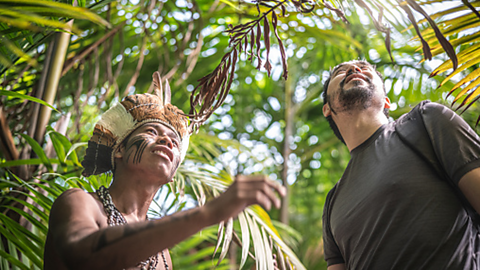
Image caption, Ecotourism works with local communities and often indigenous guides are employed to teach tourists about the area.
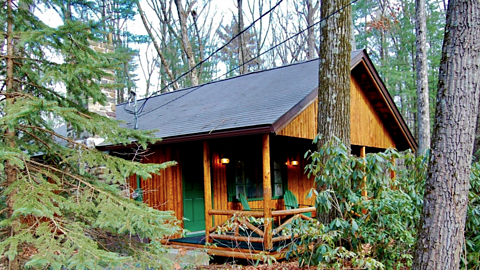
Image caption, Ecotourism is small scale to minimise the impact from tourists.
1 of 6
How does ecotourism minimise the impact on the environment and local people?
Ecotourism activities minimise the impact on the environment and local people by building on a small scale and from natural materials.
Managing tourism
Tourism can have many negative impacts on a country and it is important, therefore, for it to be managed sustainably. This can be done in a number of ways:
Government legislation
Some governments put in place laws to protect their country or area from the impact of tourism. For example, Barcelona in Spain has a law that limits the number of hotel beds available in the city and has stopped the building of new hotels in some areas of the city.
Strategies to repair damage from tourism
Sometimes it is necessary to repair damage caused by tourists. Some areas charge a tourist tax, usually a low amount so as not to discourage tourists from visiting, but enough to ensure there is money to repair any damage caused. Japan for instance has introduced a ¥1,000 fee (about £6) ‘sayonara’ tax that tourists have to pay before leaving the country.
National parks
A national park is an area that the country has designated for conservationProtection of the natural environment. and is protected by the government. In the United Kingdom there are 15 national parks where building is restricted. These include Snowdonia National Park in Wales, The Lake District National Park in England and The Cairngorms National Park in Scotland.
How many national parks are there in the UK?
There are currently 15 national parks in the UK.
Test your knowledge
GCSE exam dates 2025
Find out everything you need to know about the 2025 GCSE exams including dates, timetables and changes to exams to get your revision in shape.

More on Tourism
Find out more by working through a topic
- count1 of 2
